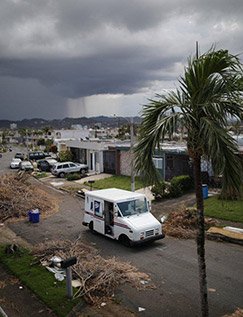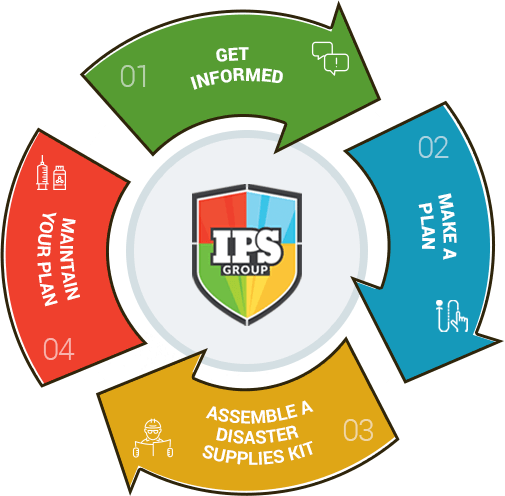How We Do It
The IPS Group operates in four distinct areas: Training, Education, Response and Community Engagement.
Terrorism, Earthquakes, Floods, Plane Crashes, Hurricanes, Epidemics, Bush Fires, Acts of Crime . . .
These are just some of the terrifying events that can happen at any time of day or night, without warning, anywhere in the world. We have seen them happen, again and again. We hear the news reports, and read the headlines.

New York Daily News 12/10/2017
Disasters have no boundaries, no timescale, and no respect for human life. And they seem to be occurring more frequently.
Before and during disasters, we need to have a plan, and we need to take both preventative and responsive action. We need to become more resilient and able to fend for ourselves, whilst also knowing rescue is at hand.
The IPS Group is the only international support organisation for all Public Safety Officers worldwide. We are dedicated to improving and expanding the resources available during emergency situations.
We are also dedicated to preparing individuals and organisations for the worst-case scenario, through education and training.
Our Mission Statement is to Respond Rapidly – Educate Widely – Train Effectively and Fund Responsibly – To Save Lives Early.
Disasters can be caused by Humans – acts of crime or terrorism, industrial or transport accidents, conflict – or by Nature – earthquakes, tsunamis, volcanic eruption, flood, avalanche, drought, fire, epidemics.
Whatever the cause, the core result remains the same: a serious disruption of society causing loss of life, breakdown of communication and transport links, overloaded rescue and medical services, loss of homes and belongings, loss of food and water supplies, infection, homelessness.
These questions and more can be answered by the IPS Group – The Future of Public Safety
The IPS Group will prove to be a major addition to world capability in Emergency Services Education, Training and Response. A quarter of a million lives were lost in the Asian Tsunami of 2004, and the 2010 Earthquake in Haiti. When experts analysed these events, the most obvious shortcoming was not the response from the rest of the world to provide food, clothing and money to the survivors. It was the untimely response of trained disaster professionals to physically be there to limit casualties and re-establish basic infrastructure.
Learn MoreWith all the best will in the world, no amount of planning or funding will suffice without educating people how best to use it. The best way to deal with a disaster is to be prepared, and the best way to be prepared, is to educate.
The IPS Group will educate people through various means, so that they can be ready to react in the right way when disaster strikes, be it natural or man-made.
Learn More

Disaster response is known as the second phase of a disaster management cycle – the first being preparedness. It includes warning and evacuation, search and rescue, the provision of immediate assistance, damage assessment, continuing assistance and the immediate restoration of infrastructure.
The aim of emergency response is to do as much as possible, as quickly as possible, to maintain life, improve health and support the morale of the affected population.
Learn MoreWhen major disasters strike, whole communities are affected. Major sections of that community may be wiped out completely, leaving the rest of the community to pick up the pieces.
In disaster management we refer to CR – or Community Resilience – that is, the sustained ability of a community to use all resources at its disposal to respond to, withstand and recover from a major situation.
Learn More
Disaster risk reduction is too important to be left to the experts.
Risk reduction begins at home, in schools, places of work and worship and throughout our local communities.
The IPS Group operates in four distinct areas: Training, Education, Response and Community Engagement.
IPS Group is dedicated to improving and expanding the resources made available for responses to any event that can save lives earlier.
IPS Group responds effectively in an appropriate way to any major disaster/emergency anywhere in the world within 24 hours